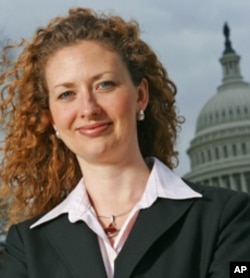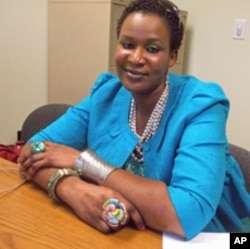Gender-based violence is a problem facing millions of women worldwide.
Forced marriage, honor killing and female genital mutilation are just a few of the human rights abuses directed against women solely because of their gender.
In the United States, a number of organizations are trying to help women who are trying to flee their country to escape this gender-based persecution, using the judicial system to help them get asylum.
Now, legislation recently introduced in the U.S. Congress aims to strengthen current asylum laws for immigrant women, which will be of tremendous assistance to these groups.
Protection against Gender-Based Violence
One of the organizations that will benefit from passage of these new laws is the Tahirih Justice Center, a privately-funded organization that has assisted more than 10,000 women and girls since its inception in 1997.
Layli Miller-Muro, the group's founder and executive director, says gender-based violence is not unique to any religion, culture or society. It's prevalent throughout the world, she says, including the United States.
"Unfortunately, it is quite an epidemic and there is no shortage of creative forms of violence against women or women and girls needing help."
One form of violence Miller-Muro's center deals with on a regular basis is "female genital mutilation" - or FGM.
It is also known as "female genital cutting" or "female circumcision."
Yaye's story
Yaye, a 36-year-old woman from a West African country she prefers not to identify, is one of the center's clients. She was subjected to FGM as a baby.
While she doesn't remember the details of her own mutilation, Yaye was present during numerous circumcision ceremonies when other girls in her village were forced to undergo the procedure.
She says that, during a circumcision ceremony, all the village girls - everyone from newborns to adult women - are
rounded up into a big room and subjected to cutting, one at a time.
"There is a mat on the floor and somebody [will] sit behind you and hold your head, then the other will hold your legs, two people hold your hands and the lady will cut you," says Yaye.
The procedure is normally performed by a midwife, or the village matriarch, who uses no anesthetic and typically uses a razor blade to cut part - or all - of the female genitalia.
Once all the girls are forcefully cut, says Yaye, they are placed in a room with a piece of cloth between their legs, where they will remain for several days.
"Every day they will come and check you: take you to the bathroom because you can't even walk. It will take weeks before you start walking," she says.
Getting help in the U.S.
Yaye left her country about 10 years ago when a forced marriage brought her to the United States.
She endured an abusive relationship during which time she gave birth to three girls. Soon after giving birth, Yaye says she started receiving letters from her relatives in Africa, urging her to bring her girls home so that they could be cut.
Yaye told her relatives that "there's no way" she was going to send back her kids.
"I believe a mother is supposed to protect their child. That's what I believe and I will do anything to protect my kids.
There's no way I will let my kids go through whatever I go through," she says.
FGM is an excruciatingly painful procedure. One third of all girls subjected to the ritual suffer major, lifelong medical complications, according to a recent study out of Kenya. Many others die from blood loss immediately following the cutting.
According to Yaye, death from FGM procedures are not taken seriously in her village.
"When they get you and cut you, you might bleed to death. It's not a big deal to them. It's just an accident."
Pressure from fellow villagers to comply with this deeply-embedded tradition is enormous. If mothers try to protect their daughters from being cut, women from the village - including family members - will kidnap their daughters and force them to undergo the procedure.
"There is no way you can hide where I come from," says Yaye, "because it's [a] very small country and even when you run away, they will get you."
A way out
Now divorced and facing possible deportation, Yaye was not sure who to turn to for help, until a friend told her about the Tahirih Justice Center.
Once she contacted them, the center took Yaye's case, assigning her an attorney and seeking asylum for her. They won their case, based on the argument that if she were to go back to her country, she would face violence for trying to protect her daughters. And if she took her daughters with her, they would be subjected to genital mutilation, despite her wishes.
The Tahirih Center's Layli Miller-Muro says Yaye's experience is just one manifestation of a much larger problem facing women around the world.
"What we see in her case - which is very common among our clients - is that the fundamental issue they suffer is the lack of respect of women and the fundamental inequality of women and men," she says.
New laws for immigrant women
Legislation now pending in the U.S. Congress would strengthen current asylum laws for immigrant women like Yaye and her family who are fleeing gender-based persecution.
Miller-Muro says if the law passes, it will be a tremendous help to the work of her center and others like it.
"It would clarify that a wider range of types of violence against women are a viable basis for protection. It would help
in the complicated legal analysis that we have to do right now in order to prove that protection," she says. "Also it would get rid of a very onerous burden for asylum seekers in the United States which is that they must file for protection under our laws within one year of arriving in the country."
In the meantime, despite everything she has been through, Yaye is glad to have spoken up, and urges other women
facing similar challenges, to also seek help.
"Anybody's who's out there, get up and stand for yourself and fight really hard. If you have kids, fight for them; they need you," she says.
After years of struggle, Yaye says she finally feels safe. And her daughters - now eight, six and four years of age - are happy and adapting well to life in the United States.






